News
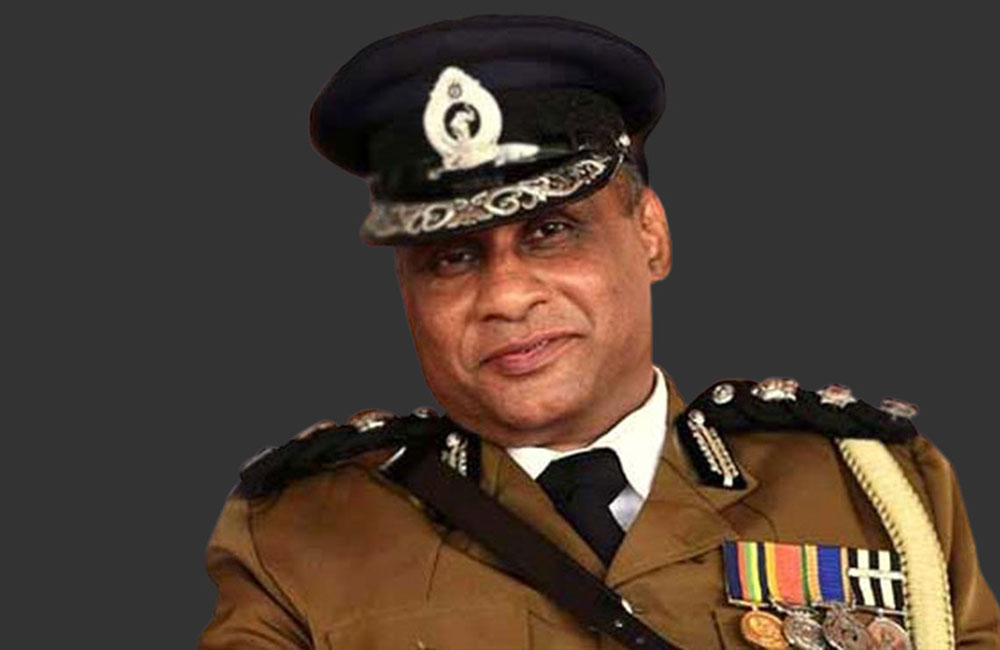
No new IGP : Former gets three months extension
President Ranil Wickremesinghe has granted C.D. Wickramaratne another service extension as the Inspector General of Police (IGP), the Public Security Ministry said.
Accordingly, IGP Wickramaratne has been granted a 03-month service extension from today as the police chief, subject to the approval of the Constitutional Council, according to the President’s Media Division (PMD).
A special meeting took place between the President and the Public Security Minister this evening (July 09) to decide on appointing a new Inspector-General of Police (IGP) due to impending retirement of Wickramaratne.
Meanwhile, President Wickremesinghe had reportedly tasked Minister Alles with deciding whether former IGP C.D. Wickramaratne should be given another tenure extension or an Acting IGP should be appointed.
Wickramaratne was initially supposed to retire from the police service on March 26, 2023, however, President Wickremesinghe extended his tenure by three months until June 26 by way of a special gazette notification dated April 06.
Thus, the position of IGP was set to be vacant since the end of Wickramaratne’s tenure on 26 June.
Senior Deputy Inspector-Generals of Police (SDIGs) Deshabandu Tennakoon, Nilantha Jayawardena, Lalith Pathinayake, Priyantha Weerasooriya and Ajith Rohana were reportedly among the nominations for the top post of the police force.
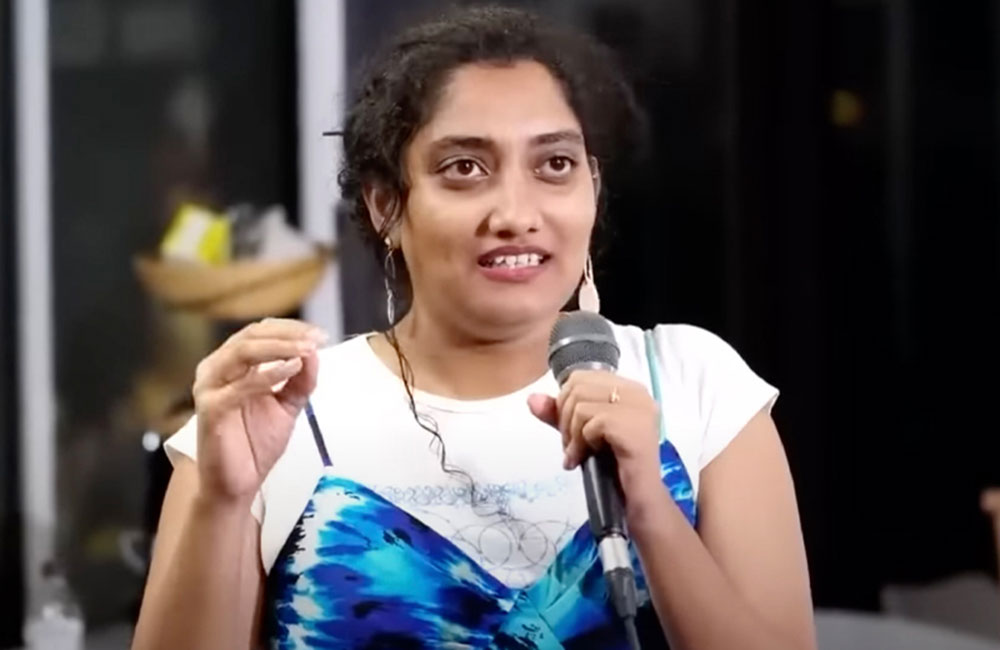
Natasha Edirisooriya granted bail
Stand-up comedian Natasha Edirisooriya who was arrested and remanded on charges of having insulted Buddhism, was released by the Colombo High Court on a personal bail of Rs. 100,000 today (05).
Natasha was charged under the provisions of the International Covenant on Civil and Political Rights (ICCPR) Act.
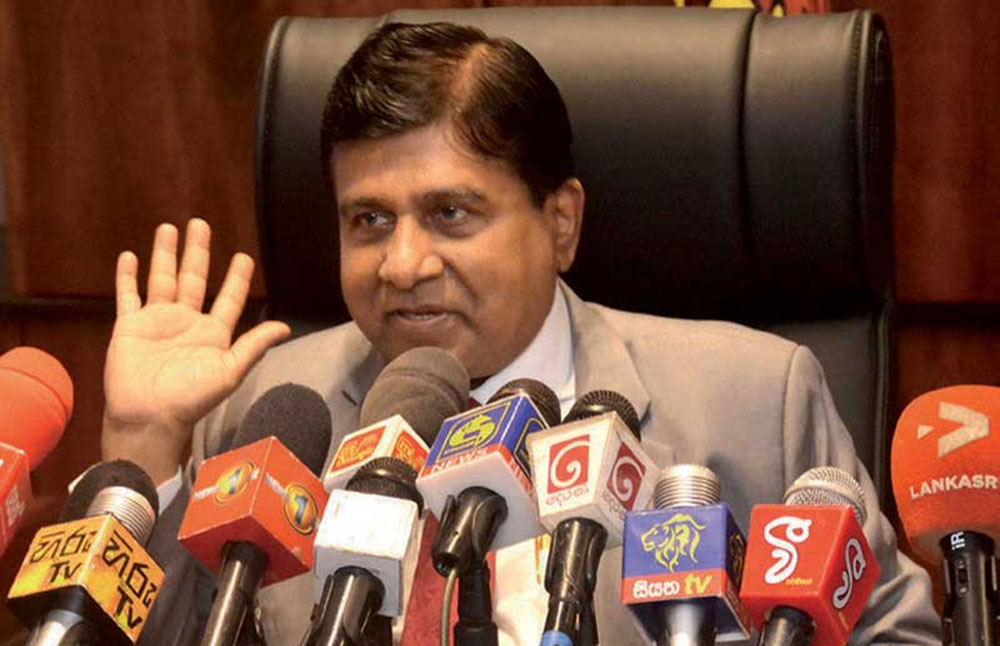
Tax Appeals Commission to be annulled
The Tax Appeals Commission will be annulled due to an inefficient tax appealing process, said justice minister Wijayadasa Rajapakshe.
A special act will be tabled in parliament soon for the purpose, he said.
The commission had not filed a single court case in the past two years, said Rajapaksa, adding that delays in taking up appeals has lost the opportunity to collect more than Rs. 117,000 million defaulted tax income.
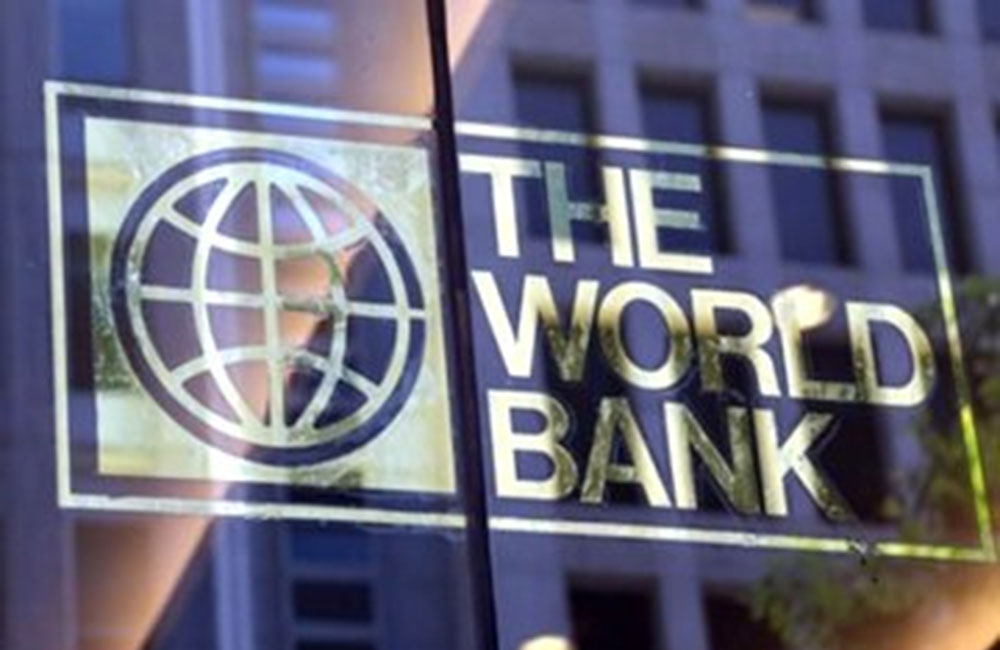
Sri Lanka gets USD 250 Mn from World Bank budget support program
Sri Lanka's State Finance Minister Shehan Semasinghe said that the 1st disbursement of USD 250 million from the World Bank Budget Support program was received on Tuesday (4).
On the 28th of June 2023, the World Bank Board of Directors also approved $700 million in financing for two operations to help Sri Lanka implement foundational reforms that restore macroeconomic stability and sustainability, mitigate the impact of current and future shocks on the poor and vulnerable, and support an inclusive and private-sector-led recovery and growth path.
The Sri Lanka Resilience, Stability and Economic Turnaround (RESET) Development Policy Operation ($500 million) will support reforms that help improve economic governance, enhance growth and competitiveness, and protect the poor and vulnerable. It will provide budget support in two equal tranches against agreed prior actions.
The Social Protection Project ($200 million) seeks to support Sri Lanka in providing better-targeted income and livelihood opportunities to the poor and vulnerable and improving the responsiveness of the social protection system.
The active World Bank portfolio as of June 26 is composed of IBRD financing worth $1.09 billion and IDA financing worth $1.17 billion. Sri Lanka lost IBRD creditworthiness and cannot access additional IBRD financing. Upon the Government’s request, a reverse graduation to regain access to IDA concessional financing was approved. Until IBRD creditworthiness is re-established, Sri Lanka will have access only to IDA resources.
The CPF will leverage the close cooperation across the World Bank, IFC, and MIGA and with development partners.
As the largest global development institution focused on the private sector in developing countries, IFC has invested close to $1 billion in Sri Lanka since the onset of the COVID-19 pandemic, helping businesses and sustaining jobs. Recently, IFC provided a cross-currency swap facility to three of the country's leading national banks that deal with over 30 percent of Sri Lanka's remittances and exports. The facility intends to support the private sector with critical financing, contributing to the country's urgent need to stabilize the economy. IFC will continue its efforts to promote private sector led growth by supporting innovation, product diversification, growth-enabling sustainable infrastructure as well as in deepening social and financial inclusion.
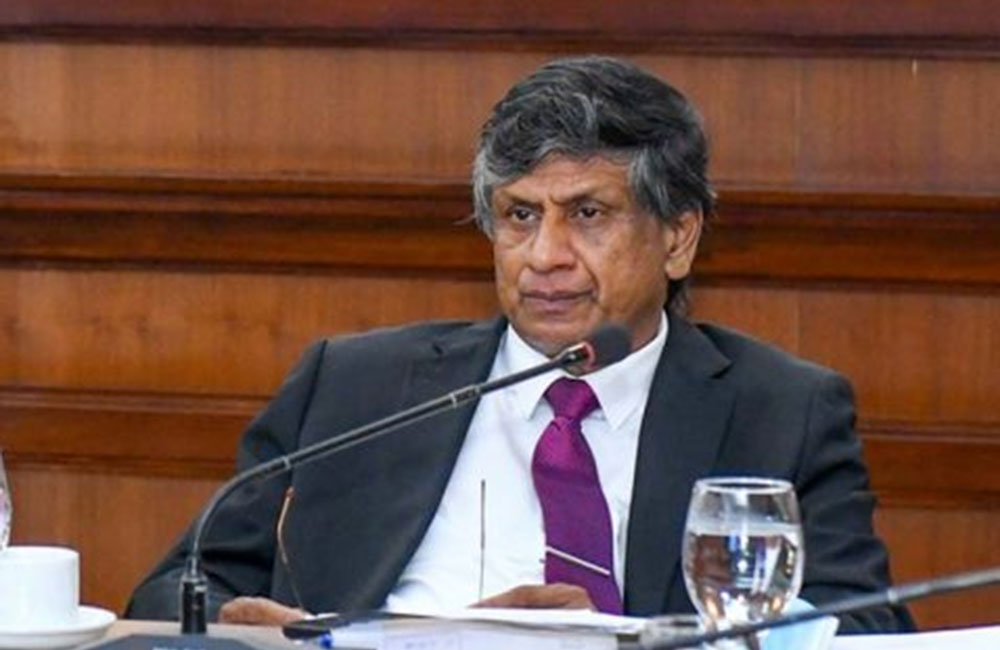
President’s Secretary writes to Ministry Secretaries on attending P’ment Committee meetings
President’s Secretary Saman Ekanayake has sent an official letter to all Secretaries to Ministries regarding attending meetings of the Committees of Parliament.
Accordingly, Mr. Ekanayake sent the letter today (06 July), while Parliament Speaker Mahinda Yapa Abeywardena and newly-appointed Secretary General of Parliament Kushani Rohanadeera were also copied, the President’s Media Division (PMD) reported.
It has been reported that in the letter of concern, Ekanayake stated that in the event the Opposition Leader wished to summon public officers for a meeting due to be held within the premises of the Parliament, he will be required to inform the relevant Minister, in writing, of the matter, who will then sanction the required officers to attend the meeting.
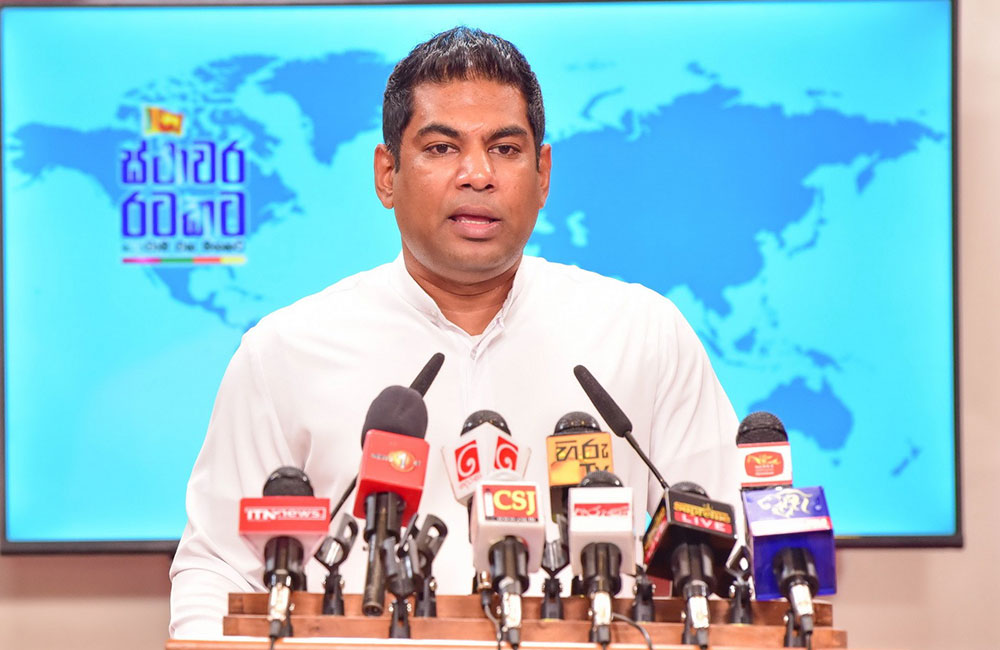
CPC repaid all loans, is on path to becoming financially stable - Minister
Minister of Power and Energy Kanchana Wijesekera has assured that the Ceylon Petroleum Corporation (CPC) is on a path towards achieving financial stability.
Participating in a media briefing held at the Presidential Media Centre themed ‘Collective path to a stable country’, Wijesekera expressed confidence in the government’s program, led by President Ranil Wickremesinghe, to promote financial stability in both the Electricity Board and the Petroleum Corporation.
Meanwhile, addressing accusations from various parties regarding the electricity price revision, the Minister highlighted that in June’s price revision, the government provided a significant 55% relief in electricity prices to 3.5 million out of the total 6 million consumers.
Addressing the press conference the minister said;
In the past year, our country faced challenges such as fuel queues and power cuts. However, under the decisions made by the new government, significant progress has been achieved in eliminating fuel queues and ensuring continuous electricity supply.
The revision of electricity prices took place in January and June, benefiting around 6 million household consumers. A 55 per cent price reduction was implemented for approximately 3.5 million consumers using 30 to 60 units of electricity.
Additionally, concessions were provided to the industrial sector during the price revision. There are approximately 40,000 registered religious shrines, and about 15,000 of them consume less than 30 units of electricity.
The electricity board had been facing significant financial losses, with a total loss of Rs. 409 billion in the past.
However, last year’s loss was reduced to Rs. 167.2 billion. The government has successfully completed all payments to suppliers and has created a favourable environment for initiating new renewable electricity projects.
Additionally, steps have been taken to remove a Rs. 120 billion debt from the balance sheet of the Petroleum Corporation, resulting in the electricity board’s improved financial position.
With the strengthened financial position, the electricity board plans to resume maintenance work and provide new connections that were put on hold in the past three years.
Out of the 36,000 new connection applications received, 20,000 connections have already been completed, and efforts are underway to fulfil the remaining connections within the next two months.
Furthermore, the Petroleum Statutory Corporation has established contracts with two new agencies for a consistent supply of fuel since September last year.
These agencies are scheduled to commence fuel supply by the end of this month, and the first fuel shipment is expected to arrive in Sri Lanka at the same time. Around 150 fuel stations have been registered by these agencies so far, ensuring reliable fuel availability.
After the arrival of their ship in Sri Lanka, fuel distribution was initially carried out under the name of Ceypetco.
However, future distribution will be conducted under their own company name. To address outstanding debts, including those owed to Indian and Iranian creditors as well as fuel suppliers, the Ministry of Finance has imposed a tax of Rs.50 per liter of fuel during distribution.
The Petroleum Corporation has successfully repaid all loans owed to the Bank of Ceylon and the People’s Bank, resulting in its strengthened financial position.
Despite this, the restructuring process of the Petroleum Corporation will continue as planned. The revised draft for the restructuring of the Electricity Board has been forwarded to legislators, and once received, it will be submitted to the Attorney General and subsequently presented to the Cabinet for recommendations.
There is a possibility of passing a new act in this regard. There is no pressure on the employees of the electricity board, and efforts are being made to verify the status of employees who have completed NVQ courses but are currently unemployed.
Legal actions are being taken against fuel stations that failed to maintain oil stocks during the fuel price revision. One such station, the Rajagiriya petrol station, has already been taken over by the government.
Complaints have been received regarding 120 fuel filling stations that did not comply with stock maintenance requirements during fuel price revisions, and future plans involve implementing appropriate legal measures.
The decision has been made not to hire new employees, as the current number of employees in the Ministry and its associated institutions is deemed sufficient.
The President, along with the Prime Minister and the government, has planned to enhance the effectiveness and efficiency of government institutions based on collective decisions.
Investors who previously submitted tenders for renewable energy have not yet responded. It has been discovered that some of the organizations that were awarded tenders have sold them to other entities.
As a result, the tender call for 500 megawatts of renewable energy is expected to be cancelled in the upcoming cabinet meeting, and a fresh tender call will be issued.
Additionally, the necessary permissions have been granted to the ‘Adani’ company for the construction of a 500 MW renewable energy power plant. Their energy generation is projected to be integrated into the national grid by December of next year.
While the majority of employees from these institutions have expressed their desire for the restructuring of the Petroleum Corporation and the Electricity Board, some protests have emerged due to concerns regarding potential loss of trade union privileges.
However, granting salary increments and bonuses to loss-making organizations is not deemed acceptable. Such practices are not prevalent in any country worldwide. A 25% salary increase every three years for the 24,000 employees of the Electricity Board has been discontinued.
Salary increments are allocated exclusively to employees who are actively working and demonstrate productivity.
It is a common practice worldwide to provide salary increments selectively rather than uniformly across an organization. Similarly, bonuses distributed in April and December is contingent upon the company’s profitability and is awarded solely to employees who contribute effectively.
In collaboration with Indian loan assistance, plans are underway to equip government institutions and religious sites with solar panels. Each religious place will be provided with a five kilowatt solar panel, while government institutions will receive solar panels suitable for their roof sizes. The implementation of this project is scheduled to commence within the next two months.
Attention has also been directed towards exploring nuclear energy options, with plans to incorporate it into the 2023-2042 generation plan.
A comprehensive evaluation will determine the suitability and viability of nuclear energy for our country, and subsequent decisions will be made accordingly.
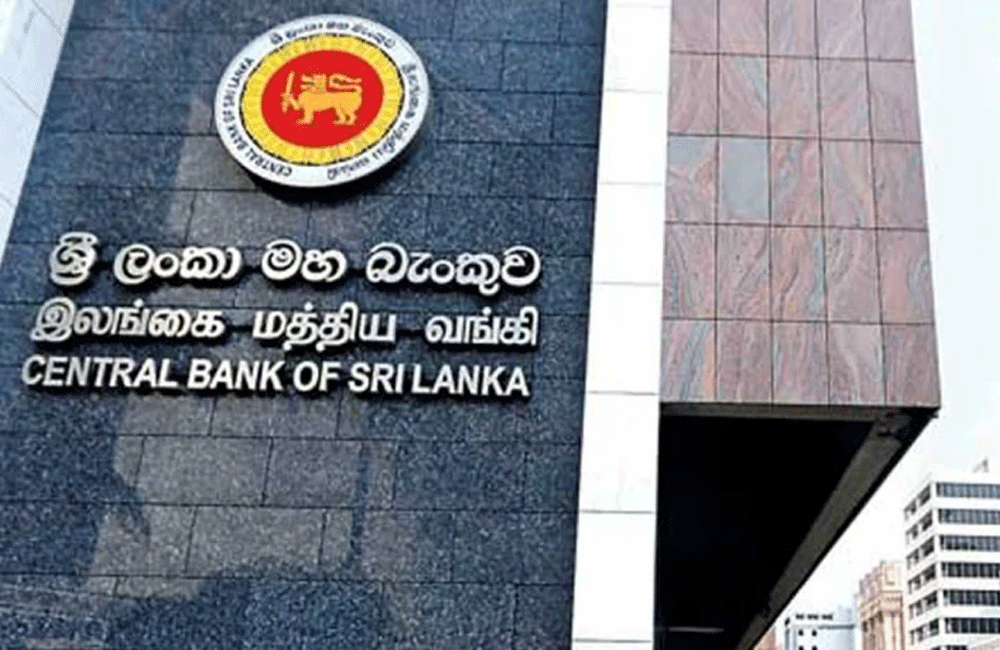
Central Bank further reduces policy interest rates
The Monetary Board of the Central Bank of Sri Lanka (CBSL) has decided to reduce the Standing Deposit Facility Rate (SDFR) and the Standing Lending Facility Rate (SLFR) of the Central Bank by 200 basis points (bps) to 11.00 per cent and 12.00 per cent, respectively.
The Board arrived at this decision, at its meeting held on Wednesday (05 July), following a careful analysis of the current and expected developments, including the faster-than-envisaged disinflation process and benign inflation expectations in the domestic economy, with the aim of enabling the economy to reach its potential and stabilising inflation at mid-single digit levels in the medium term, while easing pressures in the financial markets, the CBSL said.
The Board expects that, with this reduction of policy interest rates by 200 bps, and the reduction of policy interest rates by 250 bps in early June 2023, along with the significant reduction of risk premia on government securities witnessed recently, the market interest rates, particularly lending rates, will adjust downwards adequately and swiftly.
“Therefore, the banking and financial sector is urged to pass on the benefits of this significant easing of monetary policy by the Central Bank to individuals and businesses, thereby supporting economic activity to rebound in the period ahead,” the statement said.
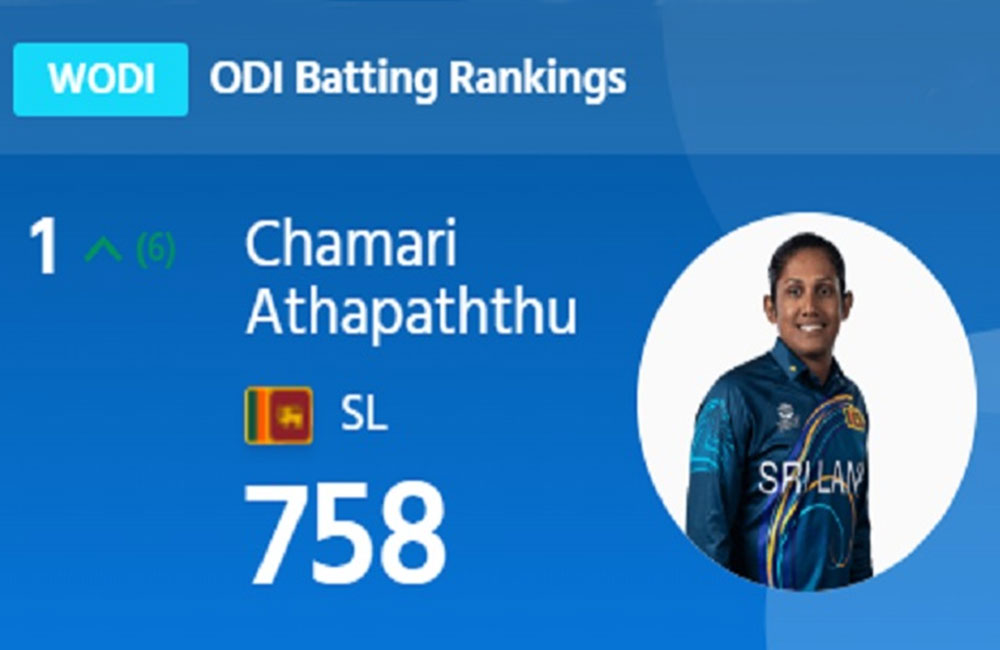
Athapaththu first Sri Lanka player to top ICC Women’s ODI Player Rankings
Sri Lanka captain Chamari Athapaththu has become the first player from her country to top the MRF Tyres ICC Women’s ODI Player Rankings after starring in a 2-1 series win over New Zealand in the ICC Women’s Championship.
The left-handed opener has thus emulated Sanath Jayasuriya, who is the only Sri Lanka player to top the ODI batting rankings for men, for 181 days between September 2002 and May 2003.
Athapaththu’s two centuries in three matches have lifted her six places, overtaking the likes of Harmanpreet Kaur, Meg Lanning and Laura Wolvaardt and displacing Australia’s Beth Mooney, who was at the top of the batting charts since 10 May.
Athapaththu won ‘player of the match’ awards for her 108 not out off 83 balls in the first match and 140 not out off 80 in the final match. She was also named ‘player of the series’, making a rapid rise from seventh position, her previous career-best ranking.
Only two other Sri Lanka players have reached number one position in the women’s rankings, both in the year 2014 – left-arm seam bowler Udeshika Prabodhani (T20I bowling) and Shashikala Siriwardene (T20I all-rounders).
Athapaththu, who has scored all her country’s top 10 individual scores in women’s ODIs, is currently at the highest-ever points tally by a Sri Lanka woman in ODIs with 758 rating points. The next best is just 587 by Dedunu Silva, who also has the next highest-ranking, reaching 11th position in April 2010.
Other Sri Lanka players to advance are Kavisha Dilhari (up 19 places to 37th among batters) and Prabodhani (up 14 places to 32nd among bowlers).
Meanwhile, New Zealand captain Sophie Devine has shot up six places to 13th after smashing a match-winning 137 in the second ODI of the series in Galle.
In the latest rankings update, which also considers performances in the ICC Women’s Championship series in the Caribbean in which the West Indies prevailed 2-0 over Ireland, Ireland opener Gaby Lewis has progressed five places to 21st after her unbeaten 95 in the final match.
For the West Indies, Shamilia Cornell (up four places to joint-24th) and Afy Fletcher (up 14 places to 32nd) have moved up the bowlers’ list.
In the T20I rankings, Sophie Dunkley (up four places to 16th) and Amy Jones (up one places to 25th) have moved up the batting rankings after the first match of the England-New Zealand series while Sarah Glenn (up one place to third) and Jess Jonassen (up four places to 18th) have moved up the bowling rankings. (ICC)

Laugfs Gas also slashes prices
Laugfs Gas PLC, one of the two largest liquefied petroleum (LP) gas suppliers in the country, has also decided to reduce the prices of its domestic gas cylinders following the significant price revision announced by Litro Gas earlier this week.
Accordingly, the price of a 12.5 kg cylinder of Laugfs LP gas has been reduced by Rs. 300, bringing down the price to Rs. 3,690.
The revised prices are as follows;
12.5kg cylinder – Rs. 3,690 (reduced by Rs. 300)
5kg cylinder – Rs. 1,476 (reduced by Rs. 120)
The Laugfs Gas Company said the price reduction, effective from midnight today (July 06), was made in a bid to directly provide the benefit of the recent price drops in the global market to the consumers.
The general public can access further details regarding the price revisions, and the district-wise prices of the gas cylinders by contacting the ‘1345’ hotline, the company added.
Meanwhile, Litro Gas Lanka had also slashed the prices of its domestic gas cylinders substantially this week:
12.5kg cylinder – Rs. 2,982 (reduced by Rs. 204)
5kg cylinder – Rs. 1,198 (reduced by Rs. 83)
2.3kg cylinder – Rs. 561 (reduced by Rs. 37)
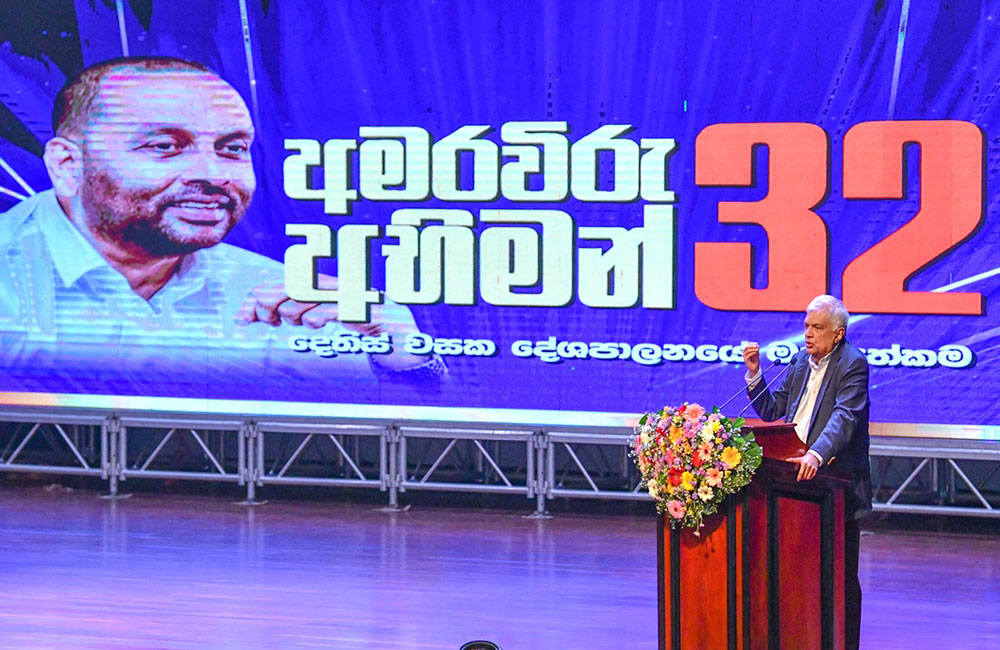
President urges opposition to prioritise national interest over politics
President Ranil Wickremesinghe emphasized the importance of avoiding misleading arguments and instead urged the entire opposition, led by the opposition leader, to join the government in addressing the country’s challenges, the President’s Media Division (PMD) reported.
He pointed out that the opposition’s allegations regarding the restructuring of local debt have been proven false.
The President encouraged the opposition to participate in the next presidential election and contribute to rebuilding the country by fulfilling their responsibilities to the people. He also expressed his willingness to assign additional duties to the opposition in consultation with the Speaker, if necessary, the PMD said.
These remarks were made by President Ranil Wickremesinghe at the “Amarawiru Abhiman 32” ceremony, which honoured Mahinda Amaraweera, the Minister of Agriculture, for his 32-year political career.
During the event, the President received a special commemorative edition of “Amaraviru Abhiman 32” and presented commemorative gifts to farmers, agriculture supporters, and students who achieved academic success in the Hambantota district.
Minister Mahinda Amaraweera presented a memento to President Ranil Wickremesinghe as a tribute to the people of Hambantota, and the President reciprocated by presenting a souvenir to Minister Amaraweera in appreciation of his dedicated service to the people of the district, according to the PMD.
President Ranil Wickremesinghe further commented: “Minister Mahinda Amaraweera has rendered outstanding service to the people of the country over his 32-year political career and 28-year parliamentary career. We should appreciate him for his wisdom and extensive experience as a politician. Throughout different eras, we have worked together as members of the party and the opposition, including serving under President Maithripala Sirisena’s leadership.
In continuation, as Prime Minister of President Gotabaya Rajapaksa’s government, I announced our intention to move forward with the participation of all members. In 2022, President Gotabaya Rajapaksa invited all Parliamentary party leaders to the President’s Office. Unfortunately, the Samagi Jana Balawegaya and Janata Vimukthi Peramuna boycotted the meeting.
During that time, I, along with Mr. R. Sampanthan and Mr. Maithripala Sirisena, discussed how to resolve this issue. Despite our efforts to bring everyone together after the incident on May 9, the Samagi Jana Balawegaya did not join us, even though they were offered the opportunity to participate without assuming the post of Prime Minister. Consequently, our government was formed, and we began our duties.
I was appointed President, Mr. Dinesh Gunawardena became the Prime Minister, and Mr. Mahinda Amaraweera was entrusted with the responsibility of the Agriculture Minister. Despite the challenges faced by the agriculture sector, Mr. Amaraweera’s leadership has allowed us to make significant progress.
We initiated a program to ensure an ample harvest before the Sinhala New Year in 2023 and formed food security committees. While we invited members from both the ruling party and the opposition to participate, the opposition did not attend. When the harvest yielded an abundance of crops, the committee presidents started distributing rice to the people, which sparked outrage among opposition members who felt excluded.
Mr. Mahinda Amaraweera and the dedicated officers who worked tirelessly on these efforts deserve our gratitude. We swiftly provided fertilizer to the farms, ensuring a seamless process from the shipment to the fields. This has contributed to food security and assistance to the less privileged.
Now, our focus is on promoting agriculture in the country, particularly export-oriented agriculture. We have mainly concentrated on meeting our domestic food requirements thus far, but it is time to produce crops that the world demands. To achieve this, we have launched a large-scale agricultural modernization effort.
Additionally, we have implemented a comprehensive plan for the development of livestock resources. We have received requests from Ambewela Company, the country’s leading livestock company, to provide them the Ridigama farm. We hope to fulfill this request to further develop the livestock sector in that area.
Notably, Amul, a renowned Indian company, has collaborated with our Livestock Development Board, and we have received interest from several other firms. It is important to highlight that we do not import animals from other countries. Instead, we encourage businesses to adopt and invest in this sector, which will lead to the emergence of new industries, particularly in the dairy sector.
Expanding our agricultural efforts, we aim to export eggs and chicken as well. However, we acknowledge that we cannot achieve this alone. Therefore, the government and the business sector must collaborate to drive these initiatives forward.
All these measures are being undertaken to ensure the country’s success. We have implemented various initiatives to improve financial stability, including reaching a staff-level agreement with the International Monetary Fund last September. Budget recommendations for 2023 have been submitted to Parliament for execution.
Increasing taxes became necessary due to the circumstances we faced. I proposed that we all collectively undertake this task. However, the opposition at the time demanded to see a signed agreement and accused the government of corruption.
Despite facing obstacles and protests, we proceeded with the initiatives in January and February. Finally, in April, the International Monetary Fund’s Executive Board approved the agreement. It was a requirement to reach a debt restructuring agreement with the Paris Club, India, and China. The opposition initially claimed that China would not agree, but eventually, China consented in March.
We then aimed to present this agreement to Parliament for approval. However, the opposition did not support it. Subsequently, we had to negotiate with the creditors, which was entrusted to our officials.
During the negotiations, we emphasized the need to reduce not only foreign debt but also domestic debt. Failure to decrease domestic debt would result in a lack of funds to pay foreign debt, as we must purchase dollars in local currency. Thus, we requested a reduction in domestic debt.
The Governor of the Central Bank and my advisor suggested that this task could be accomplished without affecting bank deposits or the Employees Provident Fund. We initiated this proposition through the State Financial Committee, which summoned the necessary officials and conducted relevant inquiries. Eventually, they agreed to the suggestion.
However, when the proposal reached Parliament, it did not receive the necessary backing, as 62 MPs voted against it. The opposition raised three main arguments. First, they claimed that the Employees Provident Fund should not be touched. However, we did not touch it, and we legally safeguarded it by establishing a minimum interest rate of 9%.
Second, the opposition argued that banks, with their interest rates at 24%, should not be exempted from taxes. We explained that interest rates would decrease further in the future, and the Governor of the Central Bank projected inflation to be brought down to 9%, which would result in interest rates between 12% and 13%. If the opposition insisted on imposing taxes, we were open to considering the amount required.
The third objection focused on not increasing income tax for banks, as they claimed it would lead to increased interest rates. We clarified that if taxes were increased, banks would charge customers higher interest rates to compensate. Therefore, we requested the opposition to provide a feasible solution for this issue. However, these three arguments were ultimately rejected by the speakers.
To address concerns about the stability of bank deposits, we assured the public that their money would be safe and separate funds were in place. We rejected the opposition’s claims that the government had lied on two occasions and emphasized the importance of their support in solving the country’s issues. We also expressed willingness to engage in dialogue with the Speaker to consider assigning additional responsibilities to opposition members and involving them in advisory panels and other projects, such as establishing the Parliamentary Budget Office.”
Cabinet Ministers, led by Speaker Mahinda Yapa Abeywardena, State Ministers, Deputy Ministers, Members of Parliament, political representatives, including Southern Province Governor Mr. Willie Gamage, government officials, and a large number of people from the Hambantota district also attended this event.
Minister of Agriculture Mahinda Amaraweera stated:
“During a challenging time when nobody took responsibility for the country, current President Ranil Wickremesinghe stepped up. Some doubted that this country, where people died in queues and farmers were deprived of the fertilizer they needed, could be revived.
However, I accepted the position of Minister of Agriculture with the belief that we should all support the leader who took responsibility for the country to overcome these challenges. It is worth mentioning that the President’s policies quickly brought farmers back to the fields.
We have plans in place to provide fertilizer to the farming community as soon as possible. The necessary arrangements have been made to supply all three types of fertilizers required for the upcoming season, ensuring a good yield in all regions. Moreover, efforts to modernize agriculture are currently underway, promising a revolution in this sector in a relatively short period.
The people of this country rejected all 225 Members of Parliament a year ago, and MPs were unable to take to the streets. Unfortunately, some seem to have forgotten this. Therefore, it is crucial that everyone supports the President’s agenda to prevent a repetition of the crisis the country faced.
It should be acknowledged that the people of this country have now realized that the current President, Mr. Ranil Wickremesinghe, is the only leader capable of developing and propelling this country forward, as evidenced by the progress made within a year.”
Minister of Ports, Shipping, and Aviation Services, Nimal Siripala de Silva, remarked:
Mr. Mahinda Amaraweera has accomplished exceptional work for the people of the Hambantota district. I express my gratitude for the opportunity to congratulate him on the completion of his 32-year political career.
All of us supported the present President because we genuinely care about the country and its people. Mr. Mahinda Amaraweera was assigned the subject of agriculture, and in doing so, we contributed to restoring the country from chaos. We even sacrificed our party membership. Mahinda Amaraweera was a trailblazer, and it is essential to make the right decisions at the right time for the benefit of the country and its people.”
Cabinet Ministers, led by Speaker Mahinda Yapa Abeywardena, State Ministers, Deputy Ministers, Members of Parliament, political representatives, including Southern Province Governor Willie Gamage, government officials, and many people from the Hambantota district also participated in this event, the PMD added.
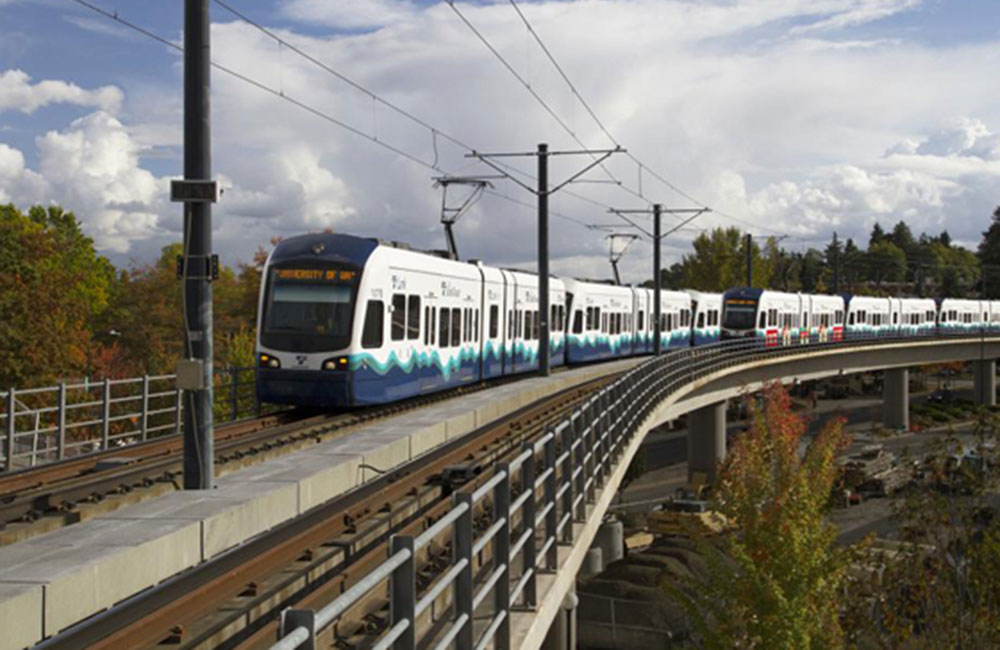
Sri Lanka to revive scrapped Japan-funded LRT project
The Sri Lankan government has decided to initiate diplomatic discussions with Japan on the revival of the Japan-funded Light Rail Transit (LRT) project.
The Cabinet of Ministers on Tuesday (July 04) approved a proposal made by President Ranil Wickremesinghe on the matter.
Accordingly, the government will prepare a timeframe to revive the previously scrapped LRT project and enter into an agreement following discussions with the Japanese diplomatic mission in Colombo.
In March 2019, the Japanese government agreed to grant loan assistance of USD 1,800 million for the LRT system project which was to be implemented that year and completed by 2026, as a solution for the traffic congestion in the city of Colombo and its suburbs.
Japan International Cooperation Agency (JICA) had agreed to provide financial facilities under concessionary credit conditions while the Oriental Consultants Global Company of Japan had agreed to provide consultancy services in collaboration with several other companies.
On March 11, 2019, Japan and Sri Lanka signed the loan agreement and exchanged notes pertaining to the project, which had been designed to construct a 17km-long elevated rail track including 16 stations to cover important and major intersections from Malabe to Colombo Fort.
Under the project, it had been proposed to deploy 25 trains for the service and each unit was supposed to comprise four air-conditioned passenger compartments to accommodate 800 passengers
The total estimated cost of the project was Japanese Yen 246,641 million, and JICA was to provide JPY 200,415 million (approximately USD 1,800 million) as a concessionary loan. The company had provided the facility of paying the said loan over a period of 40 years including a grace period of 12 years and the annual interest rate thereon was 0.1 percent.
However, in September 2020, the then-Cabinet of Ministers gave the nod to terminate the project citing heavy operating costs, and environmental damage among other reasons.
A report compiled by the National Audit Office in December 2022 revealed that Sri Lanka incurred a loss of Rs. 5,978 million after former President Gotabaya Rajapaksa-led government unilaterally terminated the LRT project.
In May 2023, the current Cabinet of Ministers decided to green-light the revival of the project days before President Wickremesinghe departed for Japan for an official visit. The decision was taken in a bid to restore Sri Lanka’s credibility with the international community.

Ministry of Health to submit cabinet paper for extending retirement age of specialist doctors
The Ministry of Health has announced that a Cabinet paper proposing the extension of the retirement age for specialist doctors to 63 years will be submitted this week.
Janaka Sri Chandragupta, the Secretary of the Ministry, stated that the decision has been put forward in response to the growing number of vacancies in the medical field.
The Ministry of Health recommended the extension of the retirement age to 63 last week, and this information was also conveyed to the Court of Appeal. The Secretary of the Ministry of Health emphasized that these points were raised in relation to a petition filed by a group of specialist doctors challenging the retirement age of 60 years.
Page 114 of 535